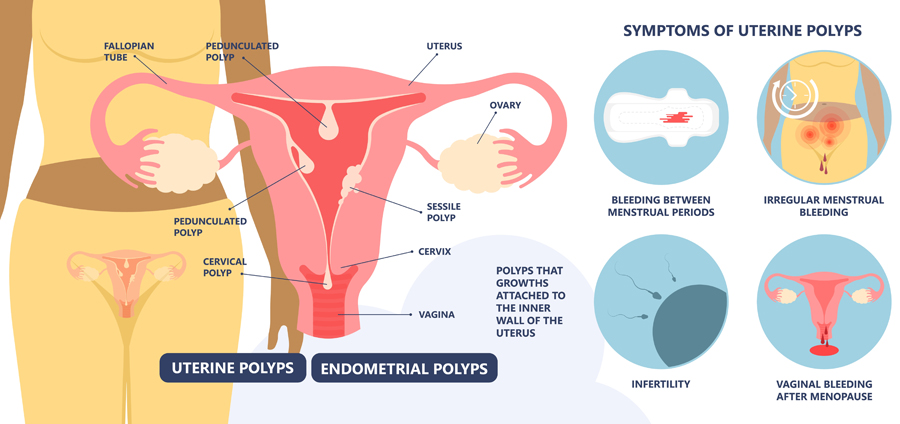
Abnormal Bleeding From Uterus
Abnormal bleeding from the uterus, also known as abnormal uterine bleeding (AUB), refers to any bleeding from the uterus that is irregular in frequency, duration, or volume. This can include bleeding that is too heavy, too light, occurs between periods, or lasts longer than usual. Abnormal uterine bleeding can occur at any stage of a woman's life and may be a sign of various underlying conditions.
Types of Abnormal Uterine Bleeding
- Menorrhagia: Excessively heavy or prolonged menstrual bleeding.
- Metrorrhagia: Bleeding between menstrual periods.
- Menometrorrhagia: Heavy and irregular bleeding that occurs both during and between periods.
- Oligomenorrhea: Infrequent menstrual periods, typically occurring less than every 35 days.
- Polymenorrhea: Frequent menstrual periods, typically occurring more often than every 21 days.
Causes of Abnormal Uterine Bleeding
Hormonal Imbalances:
- Polycystic Ovary Syndrome (PCOS): A condition characterized by irregular periods, high levels of androgens, and cysts on the ovaries.
- Thyroid Disorders: Both hyperthyroidism and hypothyroidism can affect menstrual cycles.
- Perimenopause: Hormonal fluctuations during the transition to menopause can cause irregular bleeding.
Structural Abnormalities:
- Uterine Fibroids: Noncancerous growths in the uterus that can cause heavy bleeding.
- Polyps: Benign growths in the lining of the uterus or cervix that can lead to abnormal bleeding.
- Endometrial Hyperplasia: Thickening of the uterine lining, which can cause heavy bleeding and an increased risk of endometrial cancer.
- Adenomyosis: Condition where the endometrial tissue grows into the uterine wall, leading to heavy bleeding and pain.
Infections and Inflammations:
- Pelvic Inflammatory Disease (PID): An infection of the reproductive organs that can cause irregular bleeding.
- Endometriosis: A condition where tissue similar to the uterine lining grows outside the uterus, causing pain and irregular bleeding.
Pregnancy-Related Issues:
- Miscarriage: Bleeding can be a sign of early pregnancy loss.
- Ectopic Pregnancy: A pregnancy occurring outside the uterus, which can cause bleeding and pain.
- Placental Issues: Conditions such as placenta previa or placental abruption can cause abnormal bleeding during pregnancy.
Diagnosis of Abnormal Uterine Bleeding
To determine the cause of abnormal bleeding, a healthcare provider may perform:
- Medical History and Physical Examination: To understand the pattern of bleeding and any associated symptoms.
- Pelvic Examination: To check for physical abnormalities or signs of infection.
- Ultrasound: To visualize the uterus and ovaries, and identify fibroids, polyps, or other abnormalities.
- Endometrial Biopsy: To sample the lining of the uterus for abnormal cells or signs of cancer.
- Hysteroscopy: A procedure where a thin, lighted tube is inserted into the uterus to directly view and potentially biopsy abnormalities.
- Blood Tests: To check for hormonal imbalances, thyroid function, or bleeding disorders.


